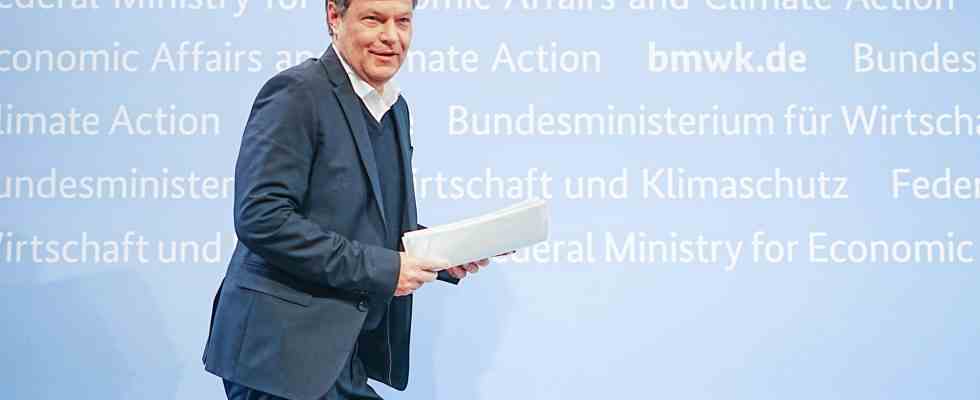Status: 09.03.2023 4:26 p.m
Economics Minister Habeck wants to counteract climate change with the expansion of renewable energies. He presented more detailed plans today. He also promised billions in funding for the exchange of oil and gas heating systems for green heat sources.
Germany wants to be climate-neutral by 2045, according to the Climate Protection Act. Federal Minister of Economics Robert Habeck now wants to increase the pace. His early ban on gas and oil heating from 2024 is causing many discussions within and outside the traffic light coalition. It stipulates that at least 65 percent of newly installed heating systems will then be operated from renewable energies. This practically means the end for new gas and oil heating systems.
The Greens politician has now commented on his plans and promised a multi-billion dollar subsidy program. It is intended to support the population in installing new heating systems. Funding should be based on income. In this way, the minister wants to ensure that households with low and middle incomes in particular can afford the switch. “Nobody runs into the basement and rips it out,” said Habeck, referring to the gas or oil heating systems that are currently still in use. There should therefore be “numerous exceptions, transitional solutions and deadlines”.
The corresponding draft law for the revision of the Building Energy Act is currently in the departmental vote within the cabinet, said Habeck at his appearance in front of journalists. “We are negotiating the details with the departments.” There are still “many specific questions” to be clarified, including those related to the production capacities for heat pumps. However, the minister emphasized that he considered the necessary production figures to be achievable.
The FDP had already commented critically on the plans. The plumbing trade and heating industry are also against strict bans on new gas and oil heating systems. The experts consider the proposals that have been on the table so far and are controversial in the coalition to be half-baked.
The question of the “big plan”
At the media event, Habeck defended the plans and announced further steps. A lot is on the way, sometimes the question of the “big plan” is asked, said the minister. “And I want to give that one today.”
Everything is geared towards the goal of making Germany climate-neutral by 2045. “More renewable energies, more energy efficiency, a climate-friendly industry. That is what we are working towards in Europe in order to secure competitiveness and jobs in the future,” said Habeck.
Accelerate approval of wind turbines
The timetable envisages doubling the current amount of renewable energy. This is necessary in order to achieve the annual target of 700 to 750 terawatt hours of electricity from renewable sources by 2030. However, the planning and approval of wind turbines on land took far too long, the ministry says nine to 17 years. “The lost time of the last ten years still hangs in our clothes like lead,” said Habeck.
Before the end of the year, his ministry wants to conclude a “pact for planning, approval and implementation acceleration” with the federal states. At a “wind power summit” on March 22, Habeck wants to present the cornerstones of a wind-on-shore strategy. It should contain suggestions as to how more space can be made available in the short term and how “municipalities can be better supported in the planning and implementation of wind projects,” the paper says.
At the “wind summit” on March 22, among other things, improved financing conditions for wind turbines will be discussed.
Image: dpa
Solar Energy Summit on Friday
Habeck also wants to expand the solar industry in Germany. “The delicate plants of the solar industry that we still have in Germany want to flourish,” said the minister. On Friday he wants to present the first draft of a new strategy at a “PV summit”. “PV” stands for photovoltaics, i.e. solar systems. According to the ministry, one of the aims is to facilitate the installation of solar systems in industrial and commercial areas.
Important components are missing from hydrogen
According to the ministry, some companies will continue to need gaseous energy sources for their production in the future. This is where hydrogen comes into play. It is considered climate-friendly if it is generated using renewable energies. However, the transport networks have not yet been developed. For the production of hydrogen, the so-called electrolysers, which are needed for the splitting of water, are still missing.
To this end, the ministry is planning its own law for this year and wants to find more suppliers. Habeck also wants to present a “power plant strategy” by the summer in order to increase output and build new gas-fired power plants in such a way that they can later use more climate-friendly hydrogen.
Favorable electricity prices for industry
Many companies complain about a locational disadvantage due to the high energy prices in Germany. In order to cushion the high energy costs, the Ministry of Economics is working on a phased model for a special low industrial electricity price. Habeck relies above all on cheap electricity from renewable energies, in that the tender price for new systems would be passed on to the industry. “For a transitional period, an interim model with direct subsidies is also being discussed at national and European level,” explained Habeck. However, the entire federal government must decide on financing issues.
The SPD warned that the industrial electricity price must be open to all sectors and “be just as accessible to energy-intensive medium-sized companies as it is to industry”. The economic policy spokesman for the SPD parliamentary group, Bernd Westphal, also had to compensate for the disadvantages compared to competitors in the USA and China.

